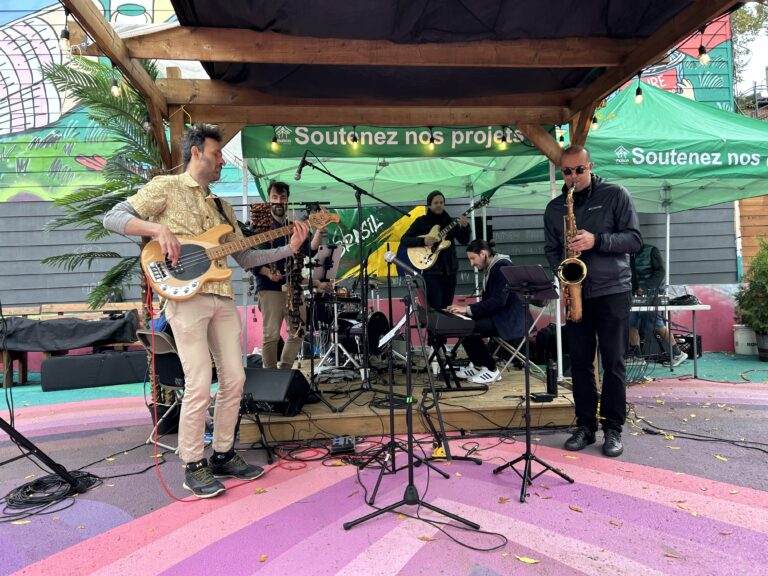On this second Brazilian day, we were treated to a sextet of high-calibre musicians on Duluth Avenue, to kick off the musical program. Under the direction of bassist Erivan GD, who accompanies several artists on the Montreal Brazilian scene, they concocted a colorful and emotional set.
I had the pleasure of seeing him at La Brassée a few months ago, but this time he had expanded his line-up for the occasion. So we had Jean-Philippe Grégoire on guitar, Santiago Ferrer on piano, saxophonist Thiago Ferté, Olivier Bussières on percussion of all kinds and drummer Shayne Assouline. Together, they managed to make us forget the cold weather at the beginning of September.
What I like about this type of performance, without vocals, is the length of the solos. From the very first tracks, we were treated to several solos, not always in the same order, alternating with each other. We had time to immerse ourselves fully in the musician’s world, in the meanders of his rhythms, before moving on to another musician. The percussionist varied his instruments, sometimes using a pandeiro, or other typically Brazilian instruments, among others.
“It’s cold so I need to move. If you want, you can move with me,” says Erivan, after opening with Afternoons by Milton Nascimento, who has just released an album with Esperanza Spalding.(MILTON + ESPERANZA – PAN M 360).
He then follows up with three of his own compositions, including Déjà vu. The instruments enter gradually, giving the impression that the musicians are dressing up the piece, layer by layer. Even during his solos, Erivan manages to maintain the rhythm and structure of the piece, allowing him to return with the ensemble seamlessly. In his role as conductor, he communicates with his musicians, who know when to come in and when to go out, all very subtly. The intensity was at its highest during Everything is sound, which at times included abrupt stops, before continuing with rhythmic flights.
“The third piece is very special to me on this day, and is called Saudade, which is a Portuguese term that’s difficult to translate into French, a bit like nostalgia,” Erivan explains, before playing a jazz / bossa, my favorite of the show. The progression was a natural one, with moments of solos but also instruments in unison. At this point, the percussionist adds his pandeiro to accentuate the group’s Brazilian touch, before ending the piece in the same way they began it.
We couldn’t end the mini-concert without including another classic, Tom Jobim’s Samba de Verão, with its goosebump-inducing piano solos. And not just because of the cold, but above all because of the intense emotions felt by the audience, who grew in number throughout the show.
























